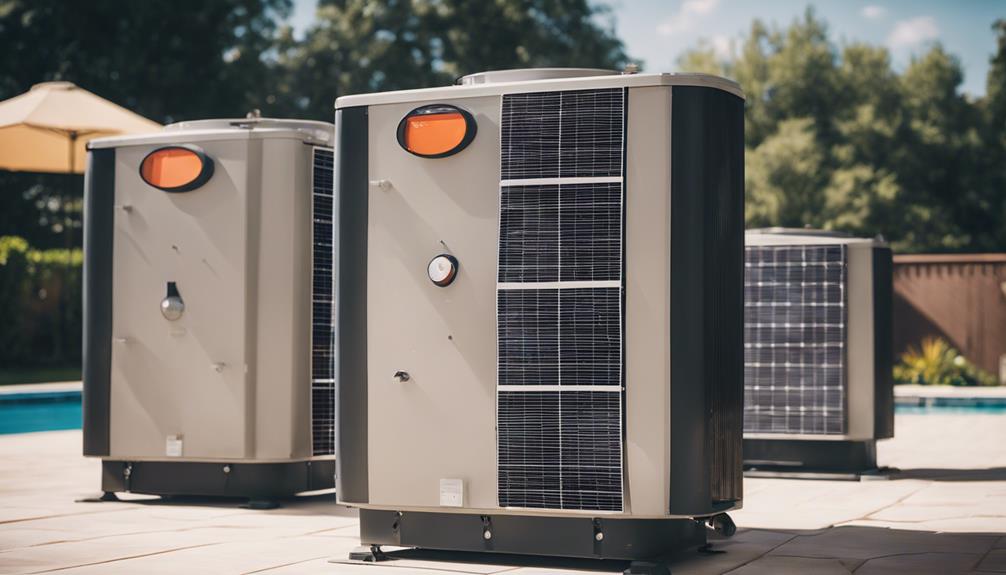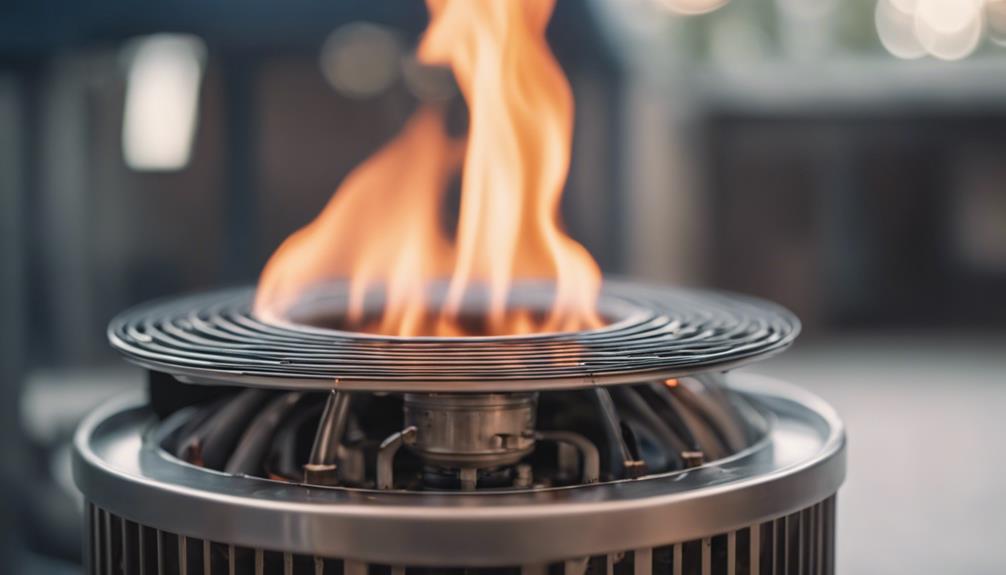Pool heaters function by pulling water into a heating tank to elevate its temperature, guaranteeing a pleasant swimming experience through the maintenance of a consistent water temperature. Additionally, they extend the usability of pools throughout the entire year, offering a favorable temperature regardless of external weather conditions. Understanding the two main types of heaters, such as electric and gas, is essential in making an informed decision for your pool. Learning more about how electric heaters utilize outside air and how gas heaters use natural gas or propane can assist you in selecting the most appropriate option for your pool heating needs.
Key Takeaways
- Pool heaters draw water into a heating tank to raise its temperature consistently.
- They extend the usability of pools all year, providing ideal temperatures regardless of weather.
- Electric heaters use outside air for sustainable heating, ideal for warmer climates.
- Gas heaters use natural gas or propane for quick heating, suitable for infrequent pool use.
- Understanding electric heaters' lower operating costs and gas heaters' rapid heating capabilities helps in decision-making.
Pool Heater Operation
Operating as the core of pool comfort, pool heaters efficiently warm water to maintain an enjoyable swimming experience. By drawing water from the pool into a heating tank, the temperature of the water is raised before being returned to the pool.
This continuous cycle ensures that the pool water remains at a comfortable temperature, regardless of external weather conditions. Pool heaters play a pivotal role in allowing individuals to enjoy their pools throughout the year, providing a consistent and pleasant swimming environment.
Without the functionality of pool heaters, the water temperature would be subject to fluctuations, impacting the overall comfort and usability of the pool. Therefore, pool heaters are an essential component for maintaining a satisfying swimming experience.
Year-Round Pool Benefits
Improving pool enjoyment all year long, pool heaters ensure a consistent water temperature conducive to year-round swimming activities. By maintaining an ideal temperature regardless of external weather conditions, pool heaters extend the usability of pools beyond the traditional summer months.
This benefit is particularly valuable in regions with milder climates like Florida and California, where pools can be enjoyed even during cooler seasons. Year-round pool use not only maximizes the investment in a pool but also provides additional recreational opportunities for individuals and families.
With the assistance of pool heaters, swimming, water aerobics, and relaxation can be enjoyed comfortably throughout the year, making them a great asset for consistent pool enjoyment.
Types of Heaters

Two main types of pool heaters commonly used are electric heaters and gas heaters. Electric heaters are known for being eco-friendly and cost-effective, making them ideal for warmer climates. They work by using electricity to heat the pool water, offering a more sustainable heating option.
On the other hand, gas heaters are efficient in rapidly heating water, making them suitable for infrequent pool use. They operate by using natural gas or propane, providing a quicker heating solution compared to electric heaters. Gas heaters, however, emit carbon dioxide and have a shorter lifespan.
Understanding the differences between electric and gas heaters can help pool owners make the right choice based on their specific needs and circumstances.
Electric Heater Details
Electric heaters, also known as heat pumps, utilize outside air to efficiently warm pool water, making them an environmentally friendly option for maintaining comfortable pool temperatures.
These heaters are ideal for warmer climates where the outside air temperature is consistently above 45-50°F.
Electric heaters have lower operating costs compared to gas heaters, making them cost-effective for frequent pool use.
While they may be slower at heating pool water than gas heaters, electric heaters are more energy-efficient and environmentally friendly, emitting no greenhouse gases during operation.
This makes them a great choice for pool owners looking for a sustainable and reliable way to keep their pools warm and enjoyable throughout the swimming season.
Gas Heater Overview

In contrast to electric heaters, gas heaters utilize natural gas or propane to efficiently heat pool water, offering a quicker heating solution ideal for infrequent pool use.
Gas heaters are known for their rapid water heating capabilities, making them a popular choice for individuals who do not use their pools regularly. While they have a lower upfront cost compared to electric heaters, gas heaters emit carbon dioxide and have a shorter lifespan.
Despite being less energy-efficient than electric heaters, gas heaters excel in quickly raising the pool water temperature, ensuring a comfortable swimming experience when needed. This makes them a suitable option for those seeking a fast and effective heating solution for their pool.
Frequently Asked Questions
Can Pool Heaters Be Used in Saltwater Pools?
Yes, pool heaters can be used in saltwater pools. Proper maintenance is vital to prevent corrosion. Regularly checking and adjusting the pool's chemical balance is essential. Salt cells may need to be cleaned more often to guarantee efficient heater operation.
Are Pool Heaters Compatible With All Pool Sizes?
When considering pool heater compatibility with various pool sizes, it's important to assess the heater's capacity and efficiency. Ensuring proper sizing and performance alignment is essential for best heating in pools of different dimensions, promoting efficient and effective temperature regulation.
Do Pool Heaters Require Regular Maintenance?
Pool heaters require regular maintenance to maintain peak performance and longevity. Tasks such as cleaning filters, checking for leaks, and servicing components are essential. Regular maintenance helps prevent breakdowns and maintains consistent pool water heating.
Can Pool Heaters Be Installed Indoors?
Pool heaters can be installed indoors with proper ventilation considerations. Indoor installation offers convenience and protection from external elements. Guarantee compliance with safety regulations and consult a professional for the best indoor installation practices.
Are Pool Heaters Noisy During Operation?
While pool heaters promise cozy swims, the noise they make during operation can disrupt tranquil poolside moments. Consider soundproofing solutions or invest in quieter models to guarantee peaceful enjoyment of your pool oasis.
Conclusion
In the intricate dance of pool heaters, these devices serve as the orchestrators of comfort and relaxation in the world of aquatic leisure.
Like skilled conductors guiding a symphony, pool heaters extract, warm, and return water to create a perfect swimming environment year-round.
Through their nuanced operation and diverse types, these systems harmonize technology, efficiency, and user preferences to guarantee a seamless and enjoyable pool experience for all.










